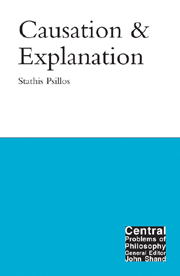2 - Regularities and singular causation
from I - Causation
Summary
The prospects of singular causation, that is, of causal relations that do not instantiate regularities, will be the main topic of this chapter. We shall focus our attention on Ducasse's critique of Hume and on his defence of singular causation. But, along the way, we shall examine Mill's version of RVC, and Davidson's attempt to reconcile RVC with singular causation.
Of clocks and hammers
According to Ducasse (1969: 9), Hume offered a definition of the meaning of causation: “Causation means nothing but constant conjunction of objects in experience.” This definition can be easily demolished. Ducasse (1969: 16) uses the following example to show that constant conjunction is not sufficient for causation. Imagine a man imprisoned since childhood who hears two clocks striking the hours. One of them is faster than the other by one second or so, so that the prisoner hears the first clock striking the hours always a fraction earlier than the other. If Hume's account was correct, then, Ducasse says, the prisoner would be entitled to claim that the “sound of the earlier clock caused the sound of the other”. But since this is absurd, Hume's account is not a sufficient condition for causation: correlation does not imply causation. It does not even follow that two correlated events have a common cause. A child's birth is correlated with the ninth reappearance of the moon in the sky since its conception, but there is no common cause for them.
- Type
- Chapter
- Information
- Causation and Explanation , pp. 57 - 80Publisher: Acumen PublishingPrint publication year: 2002

